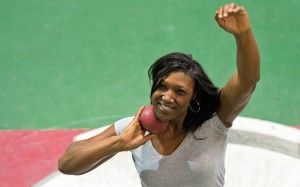SIU women address equality

February 20, 2013
A heightened sense of reform has made its way into not just the classroom for black women — but on the playing field as well, according to the SIU track and field coach.
Connie Price-Smith, the Salukis head track and field coach, said conditions for female athletes have improved since the introduction of Title IX in 1972, which is a federal law that prohibits gender discrimination in federally, funded schools. She said she believes more women can be successful in the realm of sports because of it.
“For a woman to succeed today she must dream big, but be careful of the choices you make because even the smallest thing can hold you back,” she said. “Don’t settle, keep striving and never feel inferior to anyone.”
Advertisement
Price-Smith, who was the first black woman to be nationally ranked in the shotput event for five seasons while she attended SIU, said successful female athletes are obligated to be positive role models in order for women’s conditions to continually progress.
“People like me, in my position or similar, have a responsibility to help those who come behind me,” Price-Smith said. “I have to be a good role model.”
Pamela Smoot, professor of Africana studies, said opportunities for black women in sports have become more available in recent years.
“At one time, there weren’t any funds for female sports,” she said. “There is now a larger number of women coaching in both track and basketball.”
Smoot said women have played a huge role in black history as well as sports.
“Black history month is a celebration of the achievements and contributions black Americans have provided to the USA,” she said. “One of those Americans, Wilma Rudolf, was someone I looked up to because of what she overcame.”
Expectations for modern black athletes are sometimes enormous and overwhelming, Price-Smith said.
Advertisement*
Smoot said most athletes might never elevate to the professional level, which can create perception issues.
“When athletes leave our campus, they may have been stars here, but one stigma surrounding them could be ‘why didn’t you go pro?’” she said. “It can cause someone a lot of psychological (stress) to have failed expectations from so many people.”
Price-Smith said it is important for universities to have people of color in administrative positions because it allows athletes and minority students to relate to them. She said black female athletes in particular could use more support because they aren’t afforded some of the privileges men are.
“As a woman, you’re probably not going to get great sponsorships or endorsements,” Price-Smith said. “Men tend to make more money in most areas over women anyway.”
Freshman Taylor Harris of the Saluki softball team said the challenge of being a black woman in sports is image management.
“You are not only a minority with your race but as with your gender,” she said. “You have to carry yourself with respect and a certain presence because of these things.”
Senior Saluki sprinter Laquitsha Bejoile-Hayes said a key trait for modern female athletes is mental strength.
“You have to be mentally fit,” she said. “You have to be prepared for whatever challenges that may be thrown your way. It’s not easy to be good at, but if it was everyone would be successful.”
Bejoile-Hayes said she often fills the role of mentor on the team to get her and the rest of the team in the right mindset to compete.
She said she relishes the position.
“I love being a mentor to the younger girls. Being a peer mentor makes me want to go out and perform my best on every event because I know the girls are looking up to me,” she said. “It’s a challenge, but I feel like it’s my duty.
Price-Smith gave a presentation on the history of African-American athletes Feb. 12 in the African American Museum. The demonstration, which was organized by the American Association of University Women in conjunction with Black History Month, covered the trials and tribulations of athletes ranging from Althea Gibson to Venus Williams.
Ella Lacey, a SIU alumna, member of AAUW and coordinator of the event, said she knew Price-Smith was the right person to deliver the presentation because of her accomplishments and expertise in dealing with athletes.
“I could only recall of Connie’s awards in basketball,” she said. “I used to watch her all the time. When I did further research on her, I saw how successful she was as a track and field star and I was astonished. She also won the distinguished woman of the year award when I was part of the committee to grant it. She is a great role model for all women, not just athletes.”
Price-Smith also touched on her upbringing and credited her parents and coaches for her success as an athlete.
“My parents taught me how to take care of my responsibilities,” she said. “I grew up with a lot of love and my coaches brought the best out of me.”
Advertisement








